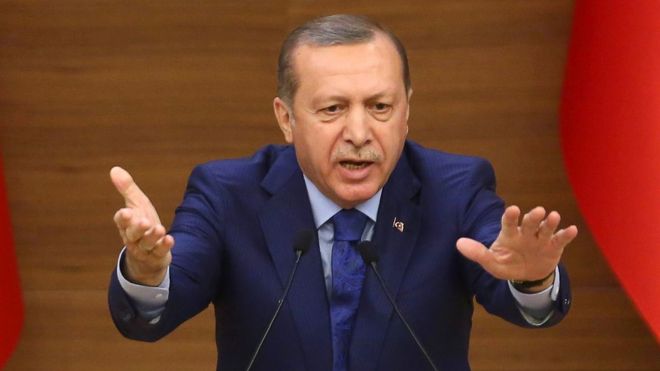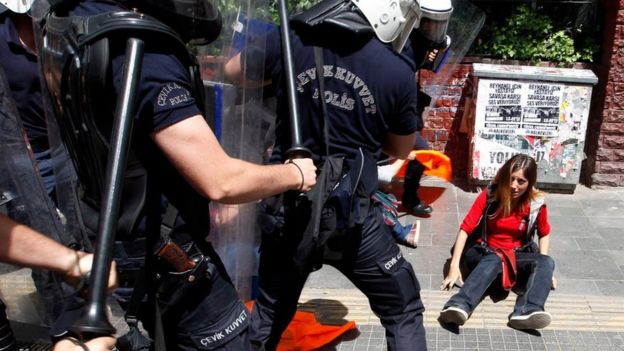 Image copyrightAFP
Image copyrightAFPPublished by BBC News 30 March 2016
Germany and the EU have dismissed Turkish protests over a song aired on German television mocking President Recep Tayyip Erdogan.
The song, aired two weeks ago on regional broadcaster NDR’s extra3 show, takes aim at Mr Erdogan’s authoritarian style while also making fun of some of his physical characteristics.
Turkey last week summoned the German envoy to demand the song be withdrawn.
But both Germany and the EU have insisted press freedom is inviolable.
In the song, Mr Erdogan is criticised on a range of issues ranging from the imprisonment of journalists to heavy-handed treatment of protesters including women (“equal rights for women – they are beaten up equally”).
“When a journalist writes a piece that Erdogan doesn’t like, he quickly ends up in jail, newspaper offices closed down, he doesn’t think twice, with tear gas and water cannons he is riding through the night,” say some of the lyrics.
 Image copyrightReuters
Image copyrightReutersThe song suggests that Mr Erdogan would rather bomb Kurds than what the writers term his “brothers in faith”, so-called Islamic State.
The song also ridicules the recent migration deal struck between European states and Turkey seeking to stem the flow of migrants into Europe in exchange for financial aid, among other benefits.
Broadcast ‘condemned’
But the Turkish leader – who correspondents say brooks no dissent – has been angered by the song, and the Turkish foreign ministry summoned Germany’s ambassador to Ankara – on repeated occasions, according to reports.
A Turkish diplomatic source told AFP news agency: “We summoned the ambassador last week to communicate our protest about the broadcast that we condemned.
“We demanded that the broadcast be removed from the air.”
Such demands got short shrift from European Commission head Jean-Claude Juncker, who “does not appreciate this movement of calling in the German ambassador just because of a satirical song”, spokeswoman Mina Andreeva told reporters.
“He (Juncker) believes this moves Turkey further from the EU rather than closer to us,” Ms Andreeva said, adding that “freedom of the press and freedom of expression… are values the EU cherishes”.
A spokeswoman for the German foreign ministry said Berlin had told Ankara basic freedoms were “non-negotiable”.
More than 1,800 people – including celebrities and schoolchildren – have been prosecuted in Turkey for insulting Mr Erdogan since he came to office in 2014, under a previously little-used law.

